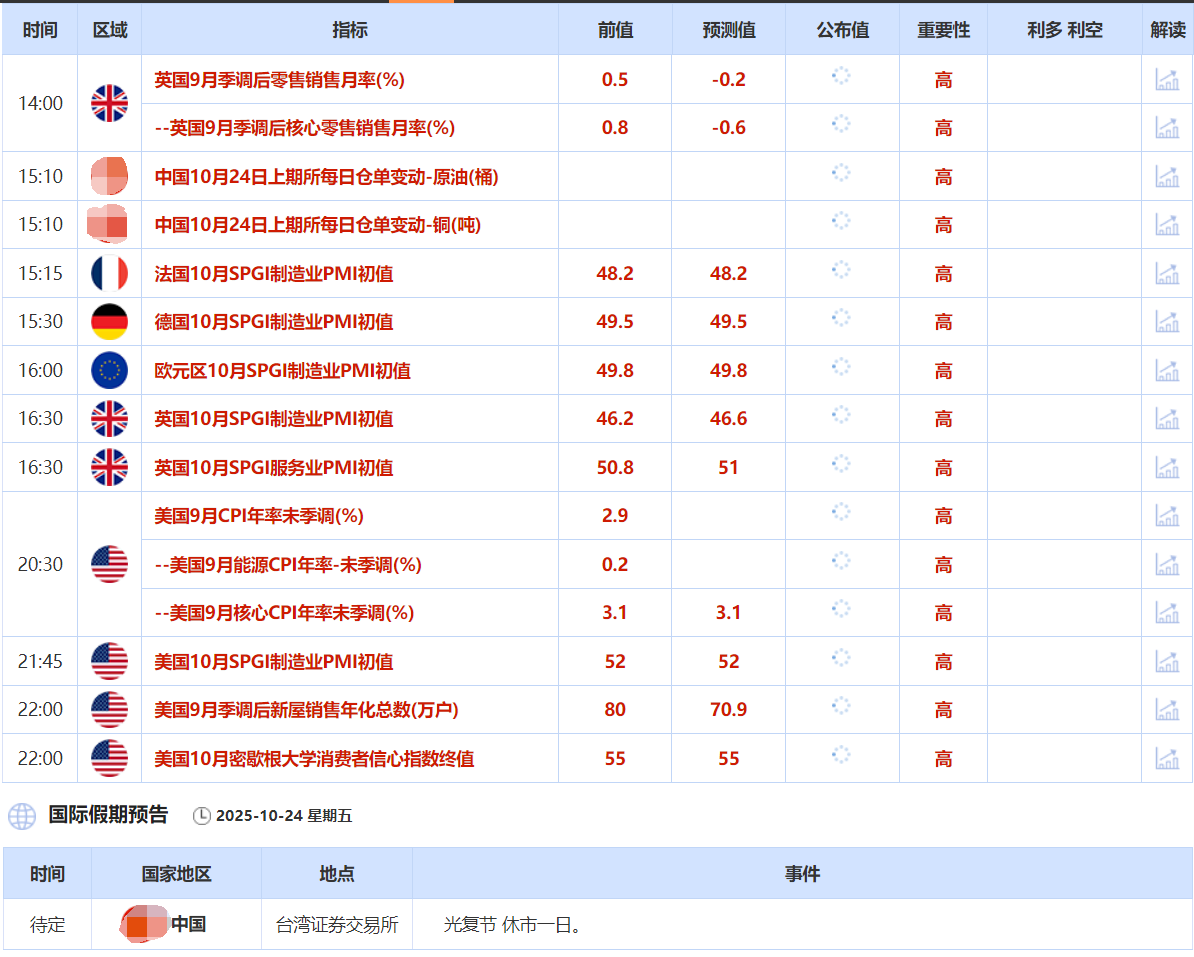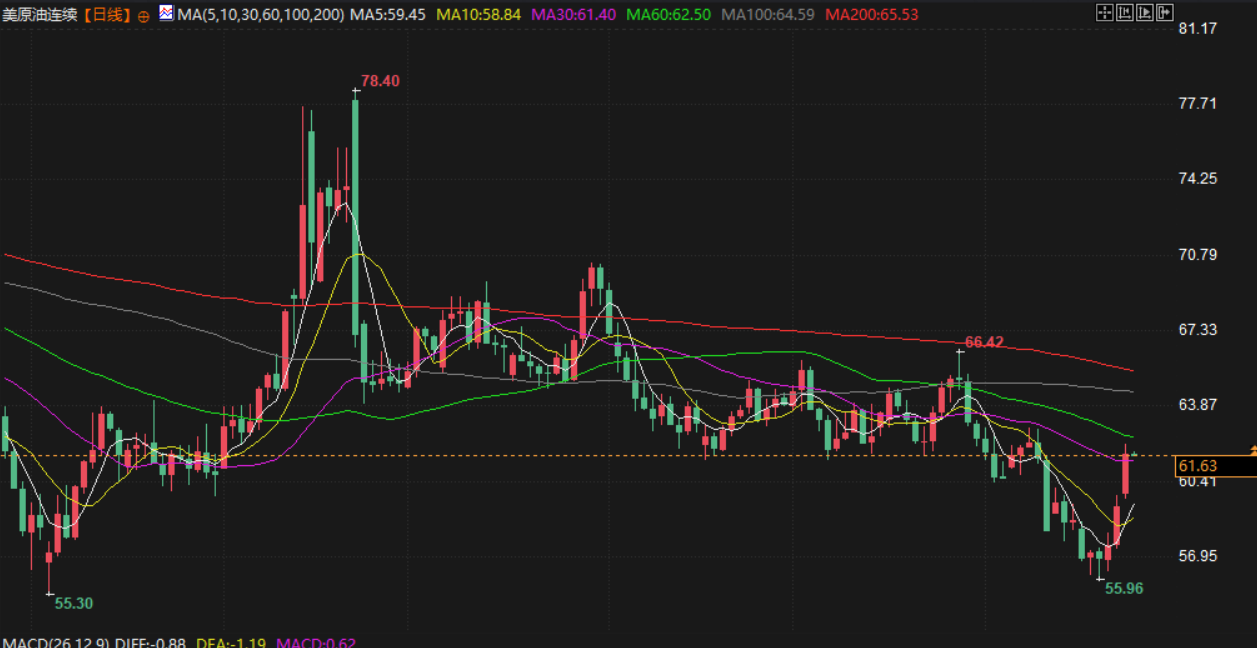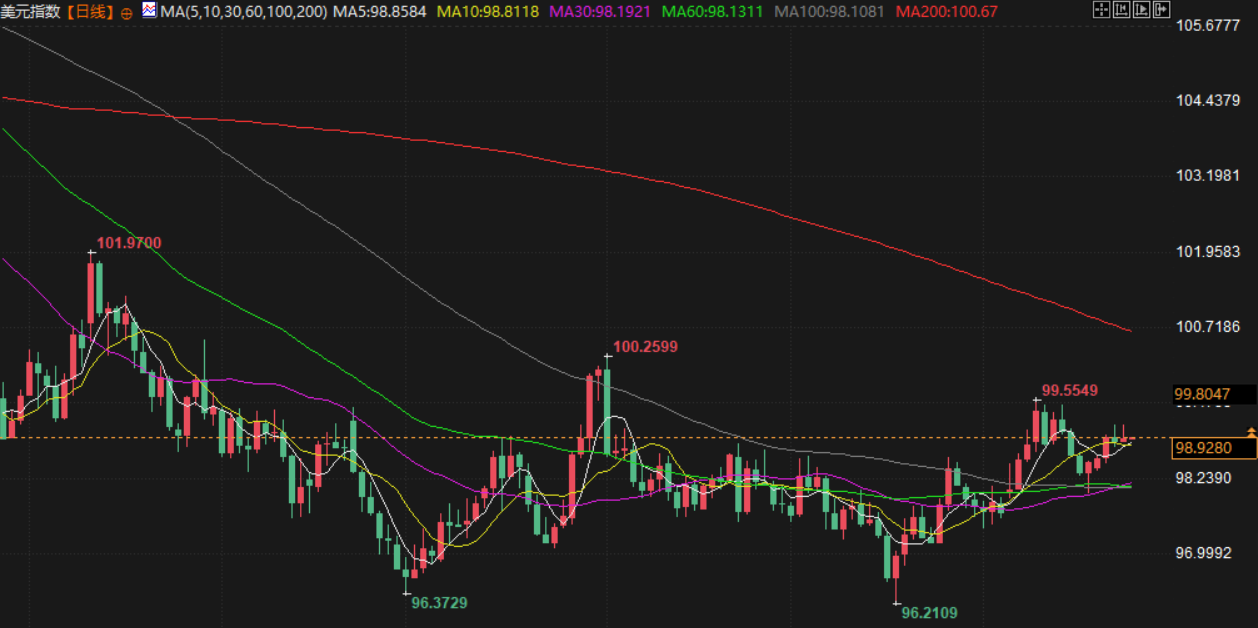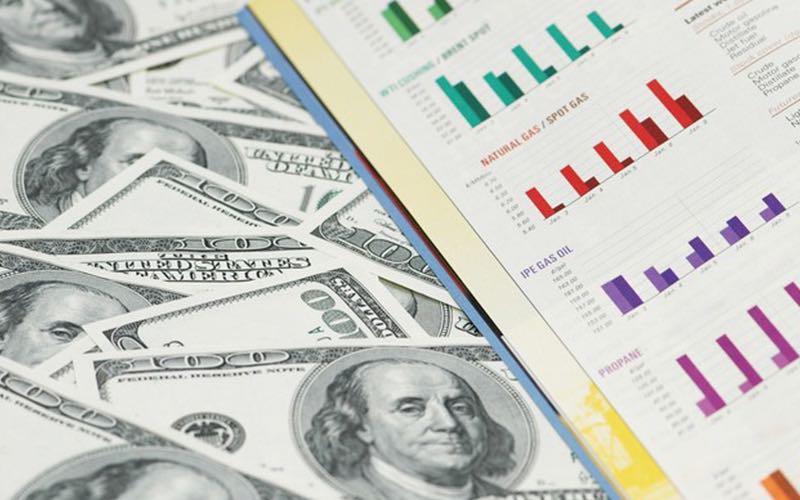October 24th Financial Breakfast: Geopolitical risk aversion demand revives gold prices; US sanctions on Russian crude oil companies push oil prices to a two-week high
2025-10-24 07:30:38

Focus on the day

stock market
Wall Street rose on Thursday as investors weighed mixed earnings reports and evolving geopolitical concerns. All three major U.S. stock indexes closed higher, with the Nasdaq leading the gains thanks to strength in technology stocks, but the small-cap Russell 2000 outperformed significantly.
Trump's announcement of sanctions on Rosneft marks a sharp shift in policy aimed at increasing pressure on Moscow over its war in Ukraine, exacerbating geopolitical disputes and sending world oil prices soaring.
The Dow Jones Industrial Average rose 0.31% to 46,734.61, the S&P 500 rose 0.58% to 6,738.43, and the Nasdaq Composite rose 0.89% to 22,941.80. Third-quarter earnings season is in full swing.
Tesla shares rebounded, rising 2.3%. The electric car maker's third-quarter profit missed expectations. The company was the first of the "Big Seven" companies, the massive momentum stocks that together account for more than a third of the S&P 500's market capitalization, to report earnings.
IBM fell 0.9% after reporting a slowdown in its key cloud software unit, which overshadowed its earnings beat.
Just over a quarter of companies in the S&P 500 have reported third-quarter results so far. Of those, 86% have beaten expectations, according to data from the London Stock Exchange Group (LSEG).
Analysts currently expect S&P 500 third-quarter earnings to grow 9.9% year-over-year, according to LSEG, up from expectations of 8.8% growth as of Oct. 1.
In other earnings reports, health insurer Molina Healthcare plunged 17.5% after cutting its annual profit forecast.
Honeywell shares rose 6.8% after the company raised its annual profit forecast due to strong aviation demand. American Airlines shares rose 5.6% after the company raised its annual profit forecast, while Southwest Airlines shares fell 6.3% despite the company reporting a surprise quarterly profit and record sales.
T-Mobile fell 3.3% despite beating analyst expectations for new wireless subscribers. Dow Chemical surged 13.0% after reporting a narrower-than-expected quarterly loss as cost cuts and higher sales helped offset weak chemical prices.
Shares of quantum computing companies surged after The Wall Street Journal reported that the Trump administration is in talks with several quantum computing companies to take stakes in exchange for federal funding.
IonQ, D-Wave Quantum, Quantum Computing and Rigetti Computing saw gains between 7.1% and 13.8%.
Energy companies, boosted by a surge in crude prices following Trump's sanctions on Russian oil, rose the most among the 11 major sectors of the S&P 500, rising 1.3%. Oil giants Exxon Mobil and Chevron rose 1.1% and 0.6%, respectively.
Valero Energy, an independent refiner, rose 7.0% after reporting better-than-expected third-quarter profit.
Heightened geopolitical turmoil has benefited aerospace and defense stocks over the past year. The S&P 500 Aerospace & Defense Index rose 2.2%.
Gold Market
Gold prices rose more than 1% on Thursday after two consecutive sessions of decline, as renewed geopolitical risks boosted safe-haven demand and investors prepared for key U.S. inflation data on Friday.

Spot gold rose 1% to $4,132.76 an ounce, having fallen to a near two-week low in the previous session. U.S. gold futures for December delivery settled 2% higher at $4,145.60 an ounce.
Gold prices hit a record high of $4,381.21 on Monday, but fell the most in five years in Tuesday trading. Peter Grant, vice president and senior metals strategist at Zaner Metals, said all the fundamental factors that have driven gold's gains this year remain in place. Some investors have opportunistically bought on price pullbacks, while heightened trade and geopolitical tensions may have also contributed to today's buying.
Gold prices have risen about 57% this year, driven by geopolitical tensions, economic uncertainty, expectations of interest rate cuts and continued central bank buying.
U.S. President Donald Trump on Wednesday imposed sanctions on Russia for the first time in his second term related to the Ukraine war, targeting Lukoil and Rosneft, amid growing frustration with Russian President Vladimir Putin over the war.
The U.S. government is also considering a plan to restrict exports of a range of software-driven products.
Focus now turns to Friday’s U.S. Consumer Price Index (CPI) report, which could be the clearest inflation signal from the Federal Reserve before its policy meeting next week. The data is expected to show core inflation holding steady at 3.1% in September.
The market has priced in a 25 basis point rate cut from the Federal Reserve next week and another in December.
Spot silver rose 1.1% to $49.07 an ounce; platinum rose 0.5% to $1,629.44; and palladium rose 0.4% to $1,453.90.
Oil Market
Oil prices surged nearly 4% on Thursday to their highest in two weeks after the United States imposed sanctions on major Russian suppliers Rosneft and Lukoil over Russia's war in Ukraine, prompting Indian energy companies to consider reducing Russian imports.

Brent crude futures rose 5.4% to settle at $65.99 a barrel, while U.S. crude rose 5.6% to $61.79. These were the biggest daily percentage gains for both crude contracts since mid-June and their highest closes since Oct. 8.
David Oxley, chief climate and commodities economist at Capital Economics, said the U.S. sanctions on Rosneft and Lukoil represent a significant escalation in Russia's energy sector, with enough impact to push the global oil market into a supply deficit next year. According to U.S. energy data, Russia is projected to become the world's second-largest crude oil producer after the United States in 2024.
In addition to the surge in crude oil prices, U.S. diesel futures jumped nearly 7%, pushing diesel crack spreads, a measure of refining margins, to their highest since February 2024.
Saxo Bank analyst Ole Hansen said the U.S. sanctions meant refiners in China and India, major buyers of Russian oil, would need to find alternative suppliers to avoid being shut out of the Western banking system.
Kuwait's oil minister said on Thursday OPEC is ready to boost crude output by further rolling back production cuts if necessary to address market shortages after the United States imposed new sanctions on Russian oil majors.
However, Russian President Vladimir Putin said it would take time for the global market to replace Russian oil.
Putin also said Moscow would never yield to pressure from the United States or any other foreign power, and warned of an "overwhelming" response if targets deep inside Russia were hit militarily.
foreign exchange market
The dollar rose against the yen on Thursday as traders awaited U.S. consumer inflation data, delayed until Friday, and weighed the impact of new U.S. sanctions on Rosneft, which have already boosted oil prices.

The dollar was last up 0.38% against the yen at 152.525 yen, while the dollar index which measures the greenback against a basket of currencies was last almost flat at 98.925.
Despite the ongoing government shutdown, the United States will still release inflation data to assist the Social Security Administration in making its annual cost-of-living adjustments in 2026.
Despite the Federal Reserve's shift in policymaking from inflation to the state of the U.S. labor market, these data will still be closely watched. Nick Rees, head of European macro analysis at Monex, said the data will be significant for slightly different reasons than usual. While the Fed has clearly moved away from focusing on the CPI, we can still use the data to make some assumptions about consumer spending and growth.
Oil prices rose nearly 5% on Thursday after new U.S. sanctions on major Russian suppliers Rosneft and Lukoil over Russia's war in Ukraine followed U.K. sanctions on the two companies last week.
The U.S. Treasury Department called on Moscow to agree to an immediate ceasefire and said it was prepared to take further action.
Marc Chandler, chief market strategist at Bannockburn Capital Markets, said the new sanctions put pressure on the yen and other currencies tied to oil imports. "Japan is a big oil importer, so higher oil prices are a negative for them," he said.
Domestic factors are also weighing on the yen, which is retreating towards a seven-month low of 153.29 yen hit last week. It had fallen to a low of 153.29 yen this week after Sanae Takaichi, widely seen as a fiscal and monetary dovish, was elected as leader of Japan's ruling party. Now that Takaichi has taken office as prime minister, markets are awaiting details of the stimulus plan.
"Buying based on policy hopes from the Sanae Takaichi administration has ended," said Yutaka Miura, senior technical analyst at Mizuho Securities. "The market now needs to assess the specific policies and their feasibility."
Some European currencies also attracted some market attention on Thursday, with the Norwegian krone appreciating on rising oil prices. The dollar was last down 0.42% at 9.9717 krone against the Norwegian krone, falling below 10 krone for the first time in two weeks, while the euro hit a one-month low of 11.568 krone.
Elsewhere, the British pound fell 0.25% to $1.332, partially recouping Wednesday's losses after weaker-than-expected consumer inflation data that boosted bets on another Bank of England interest rate cut this year.
The euro was trading at $1.162, up 0.06%. The Swiss National Bank's first interest rate meeting minutes had little impact on the Swiss franc, which weakened to 0.7949 francs per dollar.
International News
Putin: Budapest meeting with Trump more like rescheduling than cancellation
In a media interview on October 23rd, local time, Russian President Vladimir Putin stated that the new US sanctions on Russia are intended to put pressure on the country but will not have a significant impact on the Russian economy. Putin stated that, given the current situation, the US president decided to cancel or postpone the meeting; more accurately, Trump indicated that the meeting would be postponed. Putin reiterated that dialogue is always superior to any form of confrontation and far superior to war. Therefore, Russia has consistently advocated for dialogue, a position that remains unchanged.
US judge admits using AI led to erroneous court rulings
On October 23rd, local time, two federal judges, responding to questions from Senate Judiciary Committee Chairman Chuck Grassley, acknowledged that court orders criticized by Grassley as "riddled with loopholes" were drafted with the assistance of artificial intelligence. In letters released the same day by Grassley's office, Mississippi Judge Henry Wingate and New Jersey Judge Julian Xavier Niles stated that the rulings in the two cases did not undergo the usual review procedures of their respective courts before issuance. The two judges stated that they have taken steps to improve the review process of rulings.
Lithuania says two Russian planes briefly entered its airspace
On October 23rd, local time, the Lithuanian Ministry of Defense announced that two Russian aircraft had entered its airspace on the evening of the 23rd, prompting the mobilization of two Spanish NATO fighter jets deployed in the country to scramble and patrol the airspace. The Ministry of Defense stated that the two Russian aircraft entered Lithuanian airspace approximately 790 meters and flew for approximately 18 seconds, possibly conducting exercises in the Kaliningrad enclave. Russia has not yet responded to this. (CCTV News)
EU leaders postpone decision on using frozen Russian assets to aid Ukraine until December
The European Union has postponed a decision on whether to use frozen Russian central bank assets to aid Ukraine until December after Belgium demanded stronger guarantees against risks associated with the 140 billion euro ($163 billion) loan. EU leaders have asked the European Commission to draft options for their consideration at their next summit, with the goal of reaching a final agreement by the end of the year, according to people familiar with the matter.
The US government is considering supporting the quantum computing industry
The Trump administration is in early-stage talks with quantum computing companies about potential financial support for the industry, according to people familiar with the matter. Quantum computing is increasingly becoming a key area of technology. Sources say U.S. Commerce Department officials are discussing with industry executives the possibility of using funds from the CHIPS Act to support projects and companies deemed critical to national security. The talks are reportedly in the early stages, and it is premature to discuss any details regarding financing or equity investments. People familiar with the matter say the Trump administration has indicated that any financial support would require some form of return. While specific details were not disclosed, they mentioned that the government's previous agreement with Intel could serve as a model.
U.S. Transportation Secretary: If the government shutdown continues, there will be more flight delays and cancellations
On October 23rd local time, U.S. Transportation Secretary Sean Duffy warned that as the government shutdown continues, the United States may experience more flight delays and cancellations. It is reported that during the government shutdown, approximately 13,000 air traffic controllers and approximately 50,000 Transportation Security Administration officers in the United States must work without pay. Duffy said last week that since the government shutdown, flight delays caused by air traffic controller absences account for 53% of total delays, while under normal circumstances, this proportion is only 5%. Currently, the U.S. federal government shutdown has entered its fourth week, and the negative impact of the shutdown on all aspects of society has become more prominent, especially in the aviation sector. Staff shortages have led to serious flight delays, and some airports have suspended operations, causing concerns about aviation safety from all walks of life. (CCTV News)
Report: Trump warns Israel against annexing West Bank 'or it will lose all U.S. support'
"This (Israel annexation of the West Bank) will not happen because I have made a promise to Arab countries. If it really happens, Israel will lose all support from the United States." - US President Trump said this in an interview with Time magazine recently.
The US government plans to open up oil and gas drilling along the coast and in the Alaska Refuge to promote energy expansion.
On October 23rd local time, CCTV reporters learned that the US government is pushing forward an energy expansion plan that intends to open nearly all US coastal waters and the coastal plains of Alaska's Arctic National Wildlife Refuge (ANWR) to new oil and gas production. US media reports indicate that this move has sparked opposition from several state governors and environmental groups, who are concerned that the risk of oil spills could jeopardize coastal economies that rely on tourism.
Domestic News
Communiqué of the Fourth Plenary Session of the 20th CPC Central Committee: Focusing on the real economy to promote high-quality and efficient development of the service industry
The plenary session proposed building a modern industrial system to consolidate and strengthen the foundation of the real economy. We must maintain a focus on developing the real economy, adhere to the direction of intelligent, green, and integrated development, accelerate the development of a strong manufacturing nation, a strong quality nation, a strong aerospace nation, a strong transportation nation, and a strong network nation, maintain a reasonable proportion of manufacturing, and build a modern industrial system with advanced manufacturing as its backbone. We must optimize and upgrade traditional industries, cultivate and strengthen emerging and future industries, promote the high-quality and efficient development of the service industry, and build a modern infrastructure system. (CCTV News)
By 2025, the number of applications for national car trade-in subsidies will exceed 10 million.
Reporters learned from the Ministry of Commerce that as of October 22, the number of applications for subsidies for car trade-ins in 2025 exceeded 10 million, of which more than 3.4 million were for scrapping and renewal, and more than 6.6 million were for replacement and renewal. The car trade-in policy effectively promotes green transformation. In the car trade-in in 2025, new energy vehicles accounted for 57.2%, driving the retail sales of new energy passenger vehicles from January to September to increase by 24.4% year-on-year, and the market penetration rate reached 52.1%; of which the market penetration rate in September reached 57.8%, achieving seven consecutive increases. At the same time, the level of resource recycling is also constantly improving. In the first three quarters of this year, the number of scrapped cars recycled was 7.345 million, a year-on-year increase of 47.9%. According to estimates by relevant agencies, a total of about 7.1 million tons of steel, 920,000 tons of aluminum, and 930,000 tons of plastic can be recycled, promoting carbon reduction of more than 21 million tons. (CCTV News)
- Risk Warning and Disclaimer
- The market involves risk, and trading may not be suitable for all investors. This article is for reference only and does not constitute personal investment advice, nor does it take into account certain users’ specific investment objectives, financial situation, or other needs. Any investment decisions made based on this information are at your own risk.





















